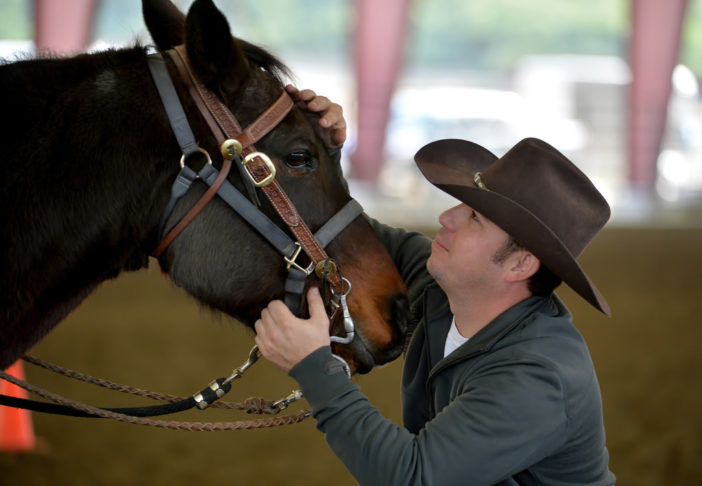There’s something both majestic and intimidating about a horse. Even as you watch him gallop across a large expanse, marveling at his beauty, you quickly step back if he gets just a little too close.
It’s a sentiment that is echoed among members of the Anaheim Police Department’s Mounted Enforcement Unit during one of its monthly training sessions. And it’s one of the reasons police departments utilize horses in law enforcement activities like crowd control.
“Everybody loves the horses…even the crooks love the horses,” said APD Sgt. Rod Duckwitz. “It’s very disarming.…Nothing moves a crowd more effectively than a horse.”
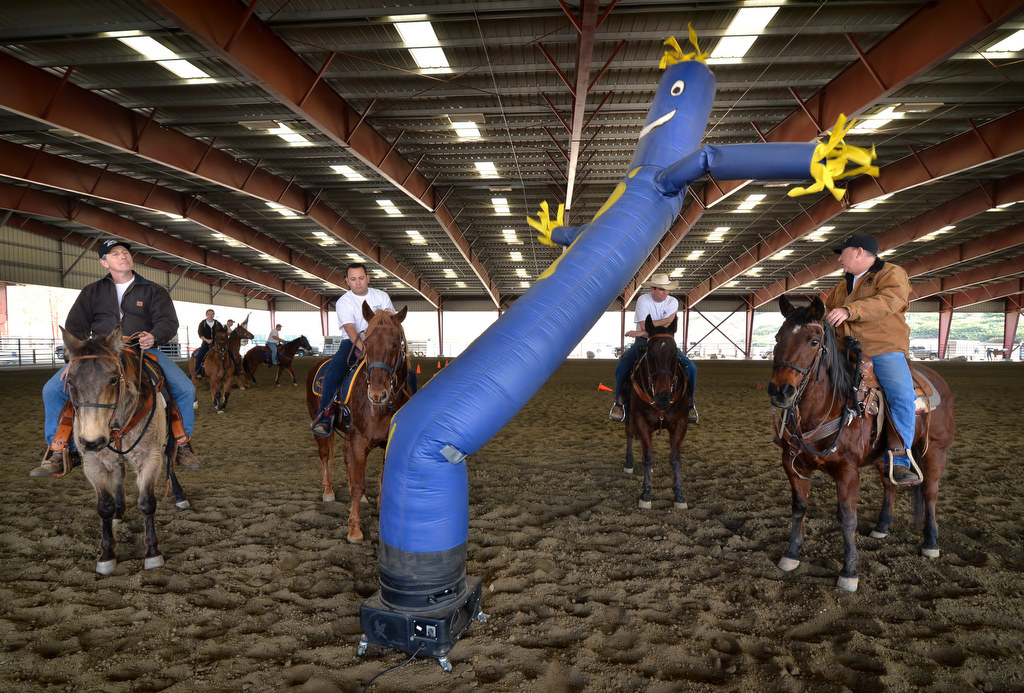
Officers from the Anaheim PD Mounted Enforcement Unit, including Deputy Chief Dan Cahill, left, Officer Joie Tinajero, Officer Mike Reichmann and Lt. Chris Pena, subject their horses to a waving air sign used at businesses and events in order to desensitize them from common objects to prevent them from becoming spooked while working in crowds. Cahill is riding Bodie, Tinajero is riding Scout, Reichmenn is riding Quatro, and Pena is riding Maggie.
Photo by Steven Georges/Behind the Badge OC
Indeed, the Anaheim PD Mounted Enforcement Unit has witnessed what adding horses to a police force can accomplish over its 21 years (2015 was the celebratory “20 years of hoof beats”), including working crowds at everything from the massive NAMM Convention at the Anaheim Convention Center to Supercross at Angel Stadium. They’ve also participated in charitable activities like visiting CHOC Children’s to help put some smiles on the faces of ill kids at the Orange hospital. They go where they’re needed.
“We’re in the schools, we patrol the parks,” said Duckwitz, adding that the officer also gets the benefit of a high vantage point sitting on a horse to better assess a situation. “It’s a great tool because you can get across a lot of ground, a lot of terrain.”
The unit – consisting of eight officers, a sergeant, lieutenant and now even a deputy chief, and their horses – is part of the Orange County Regional Mounted Unit, which consists of the seven police agencies in O.C. with mounted units (Anaheim, Garden Grove, Santa Ana, Newport Beach, Buena Park, Huntington Beach and the Orange County Sheriff’s Department).
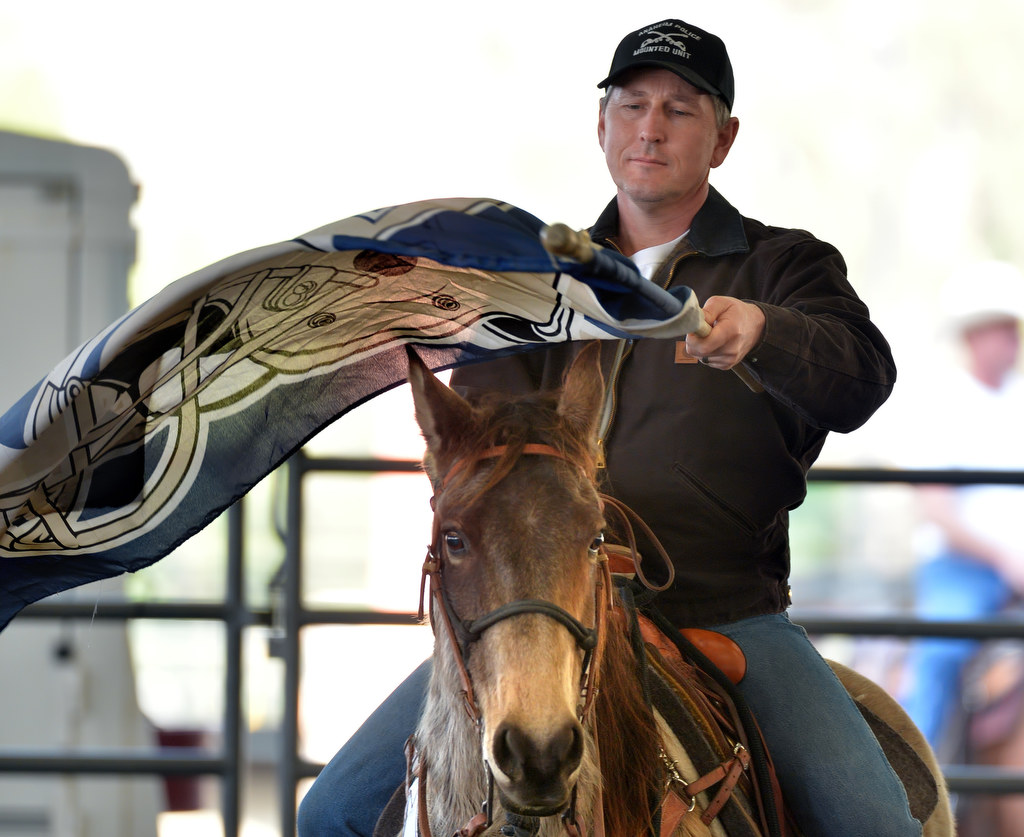
APD Deputy Chief Dan Cahill waves around a flag to help desensitize his horse, Bodie. Photo by Steven Georges/Behind the Badge OC
The Orange County Regional Mounted Unit allows the agencies to have a significantly larger presence for events that may require it, and it also allows them to split the cost for their monthly training venue.
IT’S ALL ABOUT TRAINING
So what does it take to become part of APD’s Mounted Unit?
First of all, an officer who is willing to commit the time and expense.
At the Anaheim PD, and at most of the other Orange County agencies, officers own their horse – meaning they buy them, pay for their training, stabling, veterinary and dental care, feed, tack, etc. – at no cost to the city.
After the officer selects a horse (most are American Quarter Horses) with the right temperament, he or she undergoes 40 hours of police mounted unit school with the horse.
But training doesn’t end there.
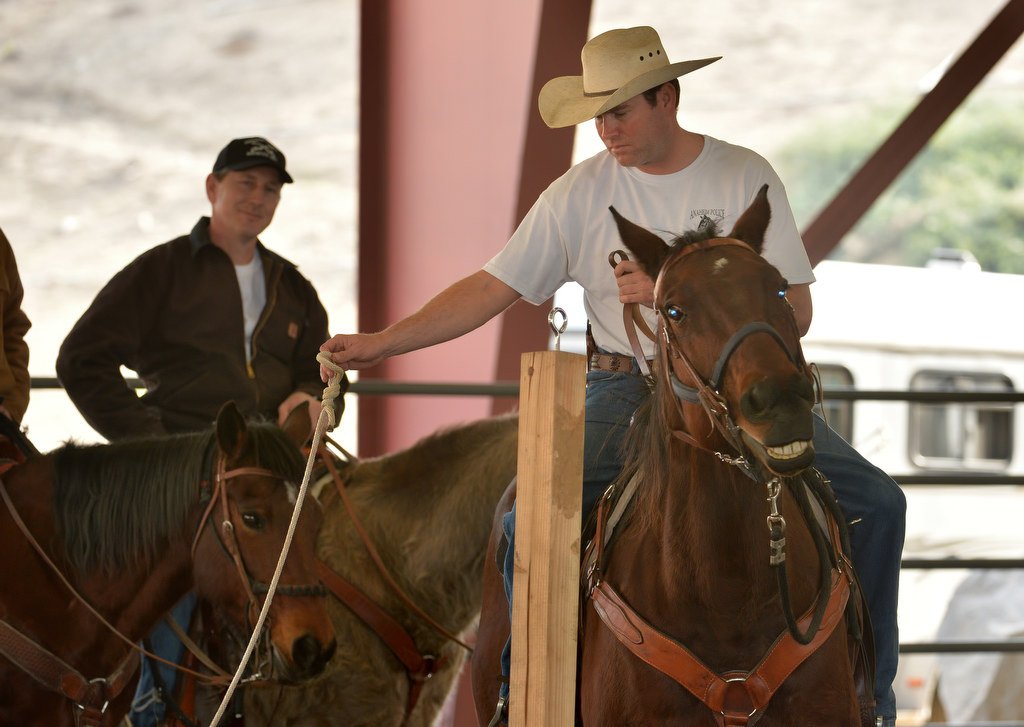
Anaheim PD Officer Mike Reichmann moves his horse, Quatro, through common objects during sensory training at the George Ingalls Equestrian Event Center in Norco.
Photo by Steven Georges/Behind the Badge OC
In addition to practicing skills that might come in handy when working an event on a horse (like opening a gate, for example), a lot of training revolves around helping the horse go against its own flight instinct. Horses are considered prey in the wild. And when prey comes across something new and unknown, it runs – which is not what you want to happen in a law enforcement situation.
“It’s all about exposing them and desensitizing them,” said APD Deputy Chief Dan Cahill with 9-year-old Bodie at his side, both new additions to the APD’s mounted unit. “In the wild, they survive by fleeing.”
To desensitize the horses, APD Officers Eric Anderson and Brian Carrion, who are the unit instructors, create a wide range of obstacles that horses must overcome. On a recent training day in Norco, there was an inflatable moving blue tube man (like the kind spotted dancing up and down at car dealerships). Other obstacles the horses are exposed to include umbrellas, balloons, loud music, cars, fireworks and gunshots.
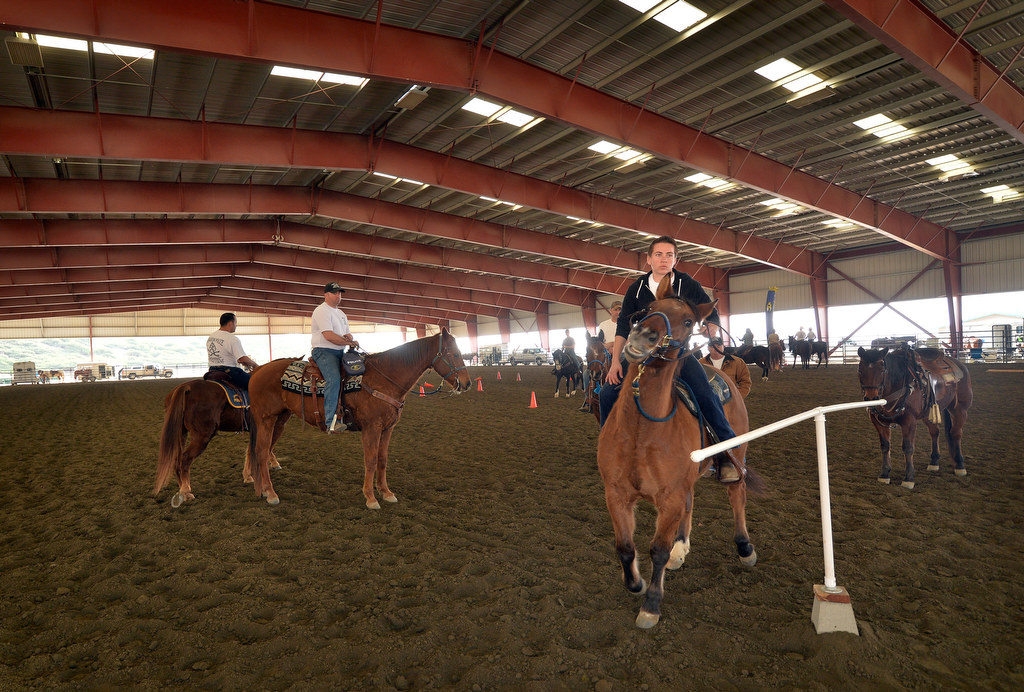
Members of the APD’s Mounted Enforcement Team take their horses through sensory training by having them move through objects at the George Ingalls Equestrian Event Center in Norco. In foreground is APD Officer Yesenia Escobar and her horse, Smoke.
Photo by Steven Georges/Behind the Badge OC
“We expose them to everything and anything,” Duckwitz said.
Anderson and Carrion always are on the lookout for things that would be out of the ordinary for the horses. The horses must learn to remain calm around these obstacles and eventually be comfortable enough to move toward the obstacles without anxiety.
One such obstacle is the “battle ball,” which Carrion described as something like a large beach ball that horses are taught to push into – once again, pushing into things is not in their nature – in order to learn how to move a crowd.
“You’ll see us out here with flags and banners and drums and noise,” said APD Lt. Chris Pena as he sat atop his extremely mellow mare, Maggie. Pena has been part of the unit for all its 21 years.
“It’s not just any horse that can do it.”
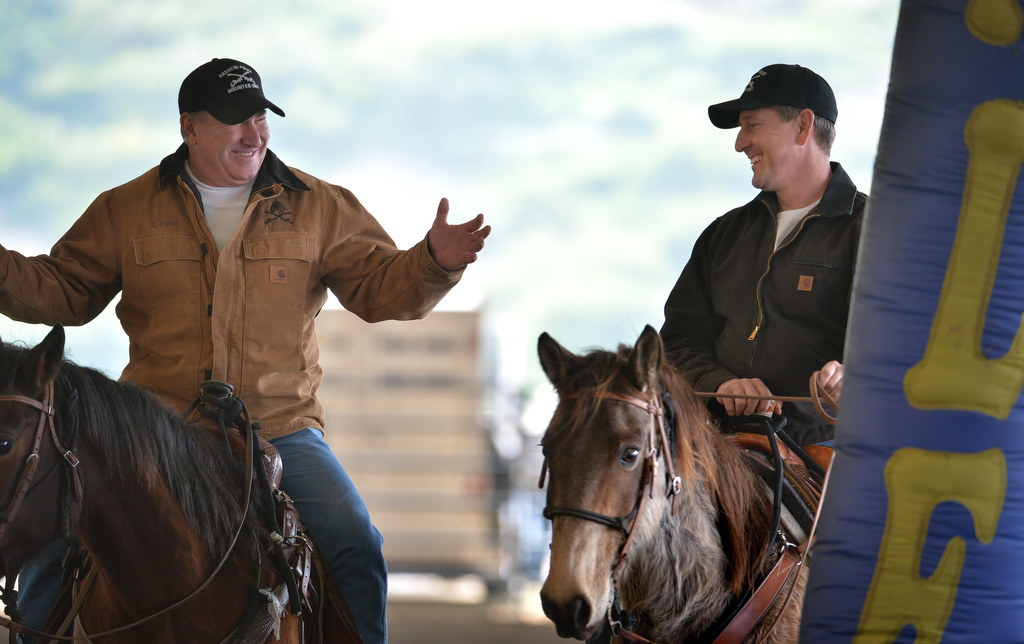
Anaheim Police Lt. Chris Pena, left, talks with Deputy Chief Dan Cahill as they take their horses through sensory training at the George Ingalls Equestrian Event Center in Norco.
Photo by Steven Georges/Behind the Badge OC
TRUST IS KEY
Training and practice are a huge part of helping the horses acclimate to all the strange situations they experience. But at the center of it all is the relationship between the horses and their partners — and trust.
As Anderson explained while guiding a riding newbie on his horse, Cash, the horse knows he will not send him into danger. If Anderson asks Cash to do something a little dicey, Cash won’t hesitate. If the same thing were asked by a new rider, Cash would most definitely hesitate. It’s that relationship that keeps the unit running smoothly.
“They build a trust — the rider and the horse,” said Duckwitz. “That horse has to trust the rider.”
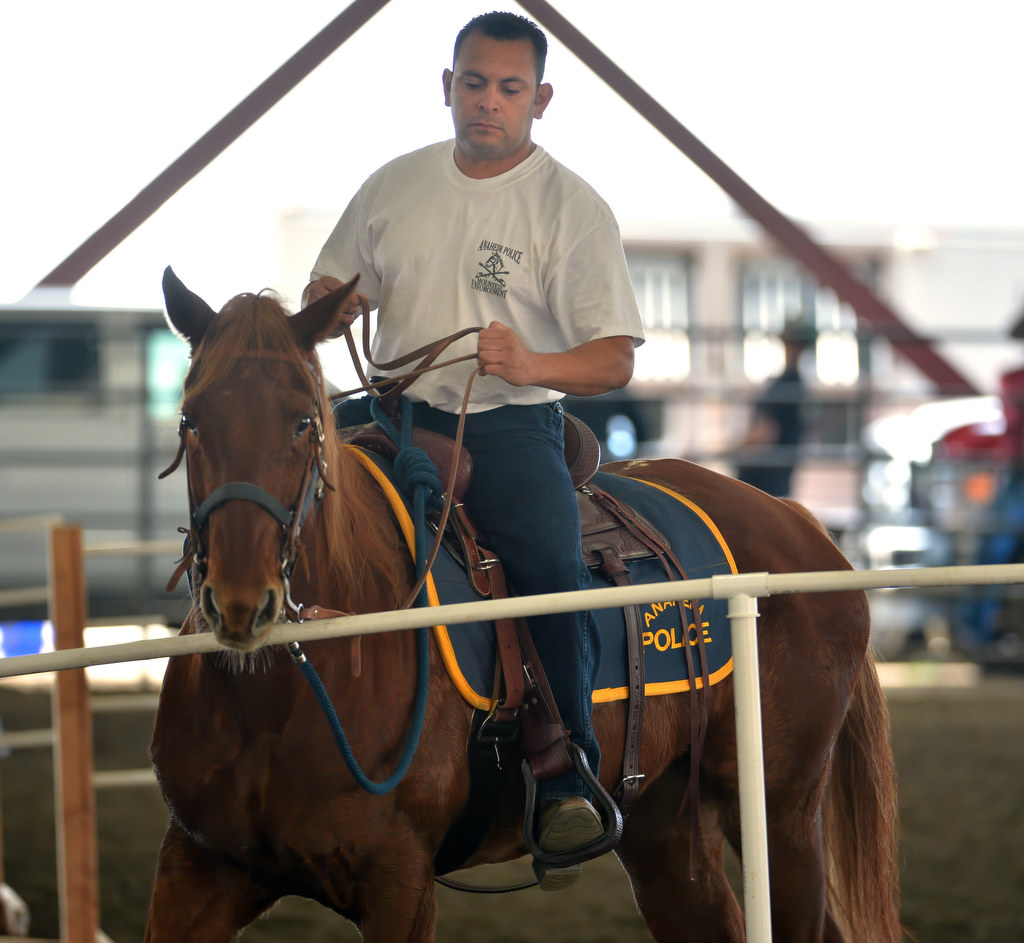
Anaheim Police Officer Joie Tinajero takes his horse, Scout, through sensory training by having him move through an obstacle course at the George Ingalls Equestrian Event Center in Norco.
Photo by Steven Georges/Behind the Badge OC
DONATE TO THE APD MOUNTED UNIT
Since horses are bought and cared for by the officers themselves, the unit accepts donations to help with the cost of maintaining these working animals. You can donate to the Anaheim Police Department Mounted Enforcement Unit through the Anaheim Community Foundation.
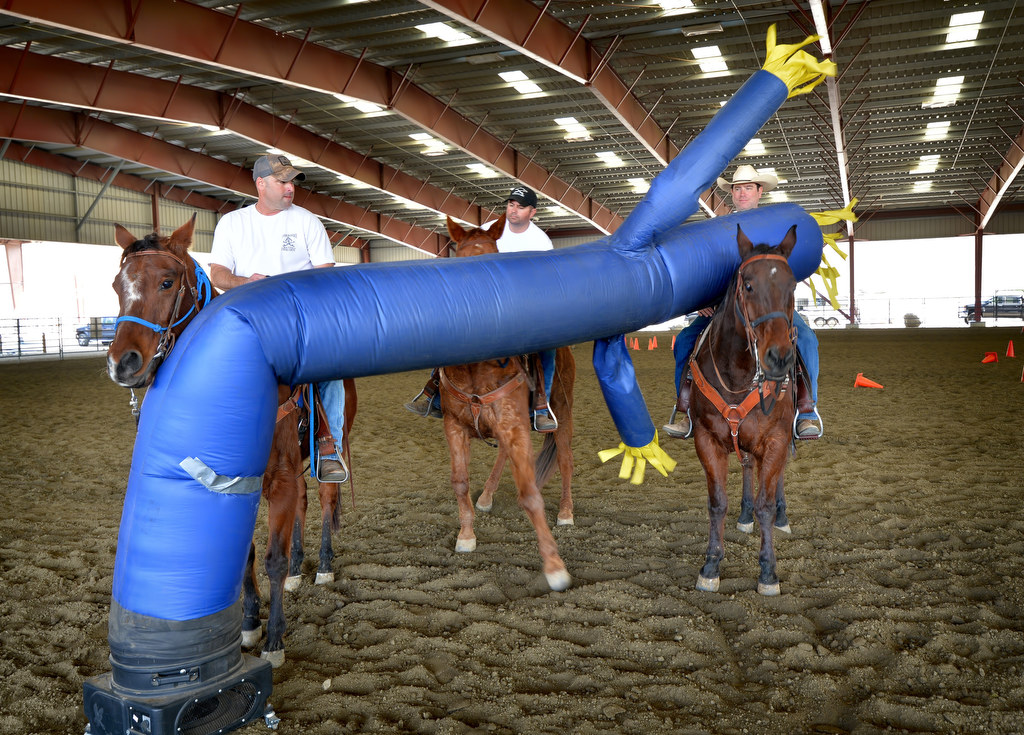
Officers from the Anaheim PD’s Mounted Enforcement Unit subject their horses to a waving air sign.
Photo by Steven Georges/Behind the Badge OC
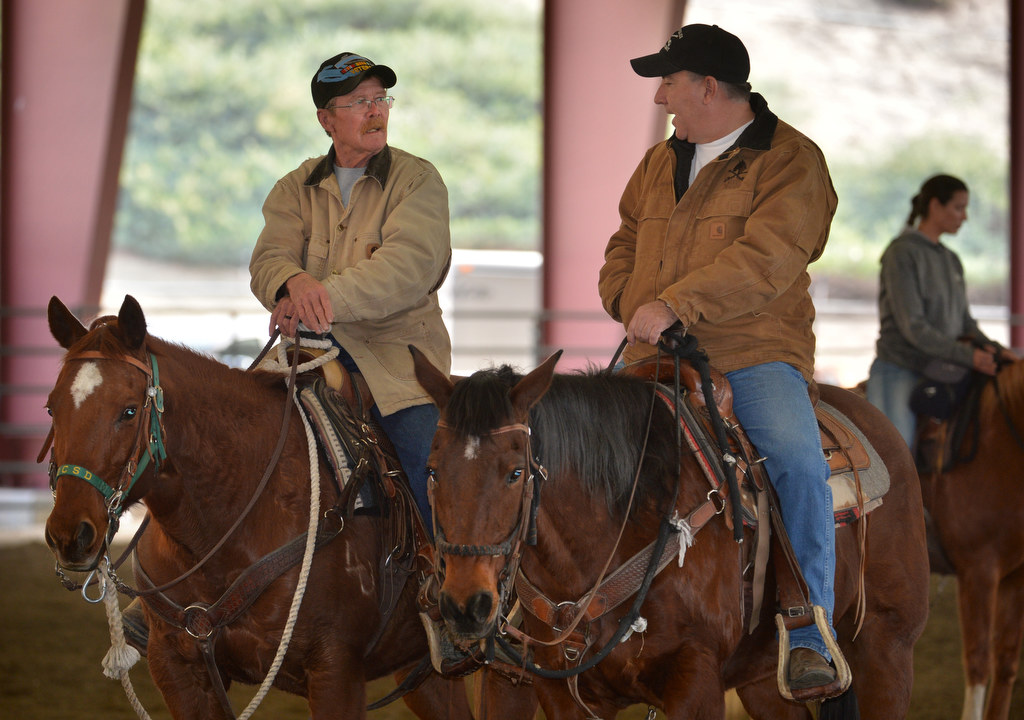
Kenny Chism (left), who runs the jail at the Garden Grove PD, and Anaheim Police Lt. Chris Pena take their horses through sensory training at the George Ingalls Equestrian Event Center in Norco. Chism is riding Copper and Pena is riding Maggie.
(left)Photo by Steven Georges/Behind the Badge OC
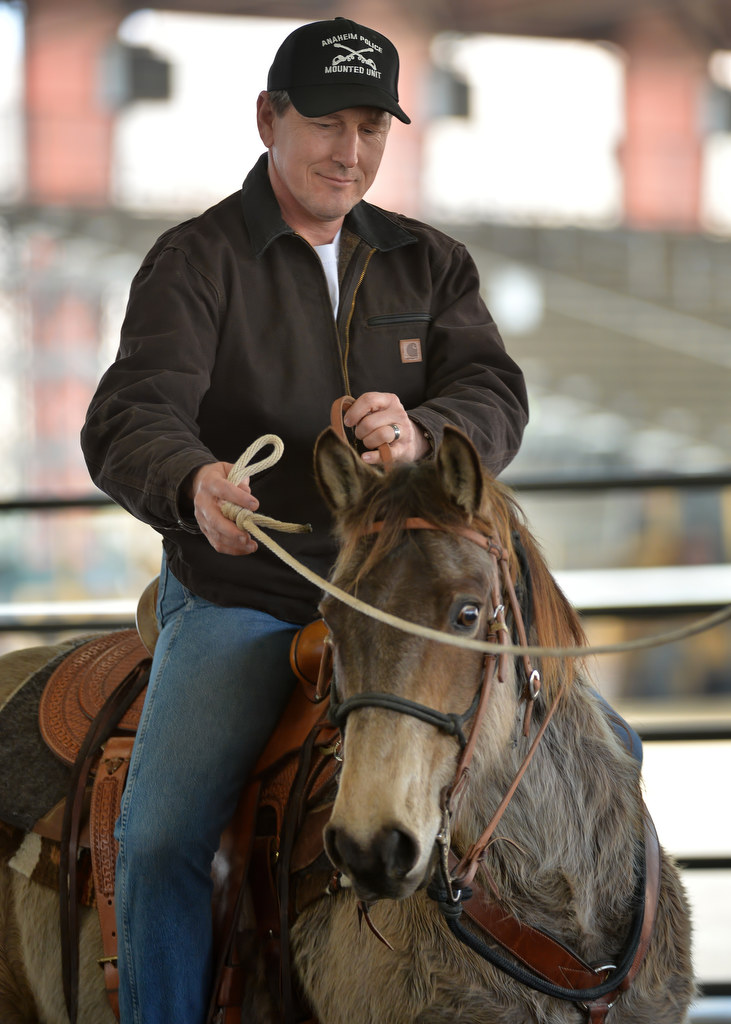
Anaheim Police Deputy Chief Dan Cahill moves a rope up and down in front of the face of his horse, Bodie, to help desensitize him from common objects found in a crowd that might normally spook a horse.
Photo by Steven Georges/Behind the Badge OC
 Behind the Badge
Behind the Badge
